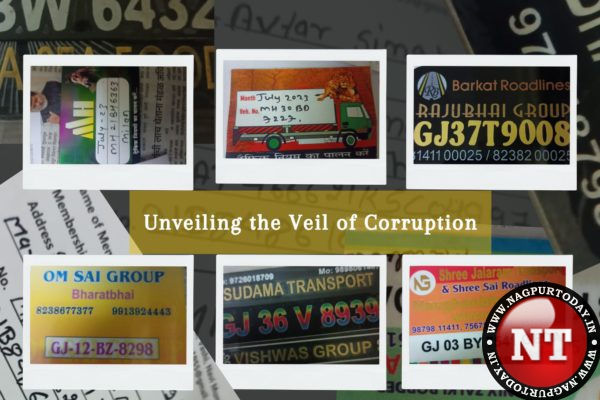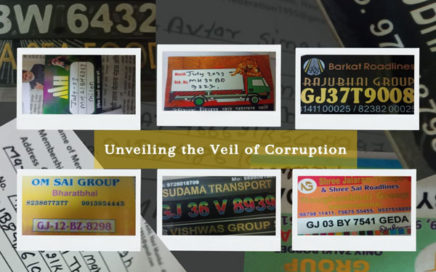Nagpur: In a disconcerting revelation, the Transport Department has once again come under the spotlight for its alleged involvement in corruption! Recent developments expose a parallel system operating within the transportation domain, masterminded by influential figures. This unscrupulous network has cast a shadow over the administrations of Maharashtra, Gujarat, Andhra Pradesh, Odisha, and Chhattisgarh, as they grapple with the ramifications of this audacious scheme.
At the heart of this illicit mechanism lie assertive power-brokers, predominantly in the states of Gujarat and Maharashtra. They have ingeniously devised a unique ‘name card’ system, wherein these cards are distributed and sold to vehicle owners. Once in possession of these cards, these influential figures operate with impunity, rendering the Transport Department powerless to enforce regulations.
Despite vocal acknowledgments of this issue by Union Minister Nitin Gadkari and Home Minister Devendra Fadnavis within their respective constituencies, the exploitative game continues to thrive. The lack of concrete action only raises further questions about the integrity of the system and the resolve to tackle corruption head-on.
Shockingly, the cardholders enjoy immunity from inspections and penalties. Attempts by officers to intervene or question cardholder vehicles at checkpoints often result in trouble, with threats and complaints being employed to coerce officers, sometimes escalating to physical assaults.
Insider information reveals that these powerful operators within the transportation sector have cultivated connections with senior transport officials and anti-corruption authorities. This influence has created an alarming scenario where officers at checkpoints turn a blind eye to cardholder vehicles, avoiding scrutiny altogether.
The notion of imposing fines has become virtually non-existent. This unchecked freedom granted to cardholder vehicles not only causes substantial revenue losses for the government but also facilitates the unhindered movement of contraband goods. A culture of silence has enveloped officials, driven by fear of reprisals.
The implications of these rogue cardholder vehicles for society and the nation at large cannot be underestimated. Their activities have given rise to a sprawling underground network of illegal and corrupt operations. Initial attempts by the Transport Department authorities near the Gujarat border to curb the circulation of these illegal cards resulted in a staggering influx of Rs 2.5 Crore in fines within a mere eight days. The extent of this nefarious racket’s drain on the treasuries of five states is deeply alarming.
A nexus comprising officials from the Transport Department, individuals associated with the Anti-Corruption Bureau, and politicians seeking personal gains has emerged. These actors collude in the buying and selling of cards bearing names such as the Federation, Transport Union, and Truck Owners Group. This shadowy and immensely profitable nationwide enterprise thrives on exploiting regulatory loopholes. As the governments of the five states contemplate launching investigations, a harrowing web of corruption and malfeasance may be uncovered, exposing colossal financial losses for government treasuries.
Disbanding the architects of this elaborate scheme need not be a formidable task, as these individuals, fueled by arrogance, openly conduct their illicit trade. They brazenly operate under their own names and numbers, reaping exorbitant profits with audacity.
A simple examination of the card, bearing a name and number, could potentially unravel the truth. The proliferation of these illegal cards wreaks havoc not only at checkpoints like Navapur, Harakhed, Kandari, Saoner, and Devri but also at border posts in other states. The orchestrators of this web hail mainly from Gujarat, with figures like Navghan, Jiya, Bharat, Raju, and Vishwas leading the charge. Maharashtra’s Devri contributes its own set of individuals, including Bhatiya Mandali, Barkat, Afsar, and Shivhare, who are at the helm of this covert trade.
– Ravikant Kamble & Shubham Nagdeve















